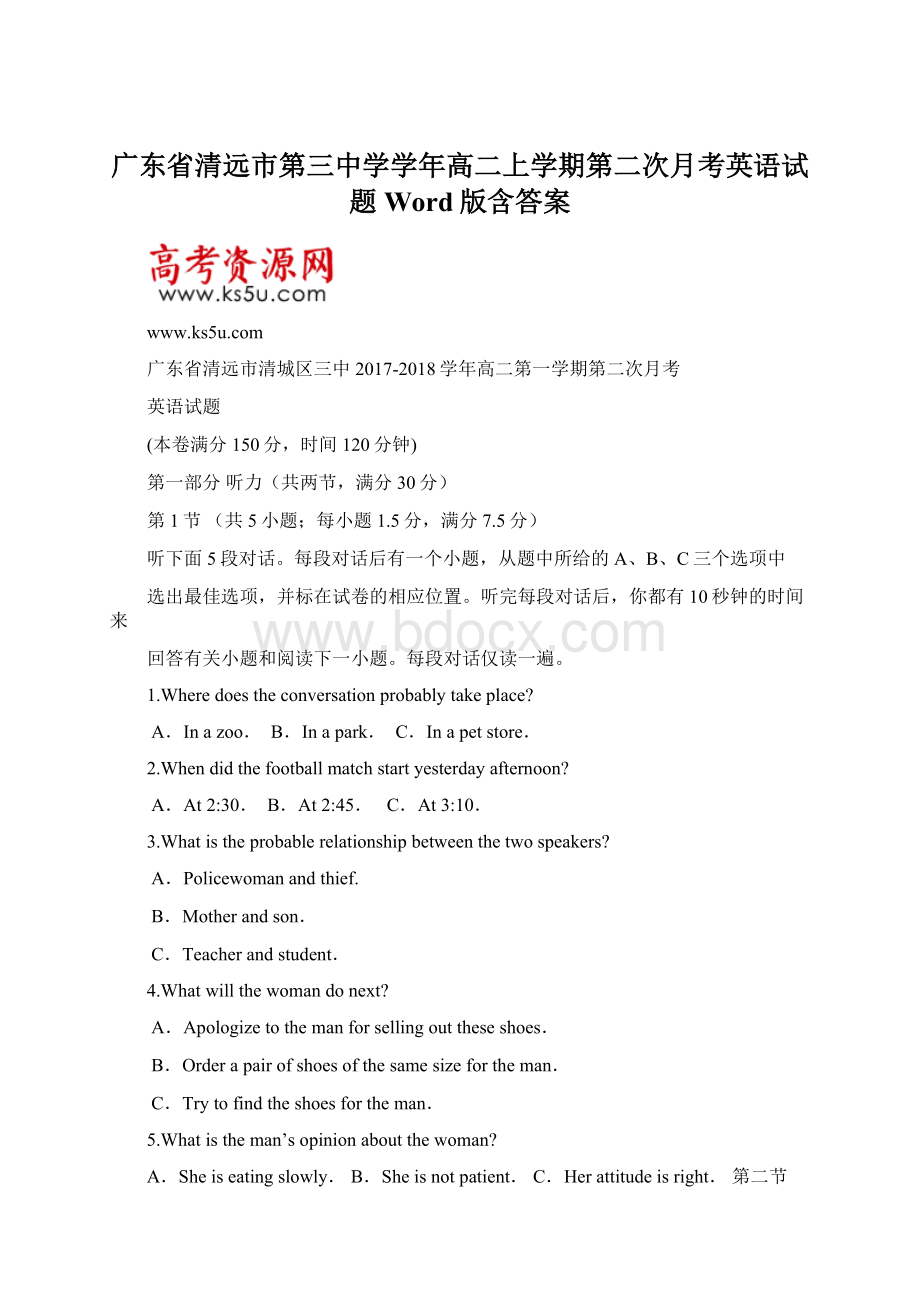广东省清远市第三中学学年高二上学期第二次月考英语试题 Word版含答案.docx
《广东省清远市第三中学学年高二上学期第二次月考英语试题 Word版含答案.docx》由会员分享,可在线阅读,更多相关《广东省清远市第三中学学年高二上学期第二次月考英语试题 Word版含答案.docx(14页珍藏版)》请在冰豆网上搜索。

广东省清远市第三中学学年高二上学期第二次月考英语试题Word版含答案
广东省清远市清城区三中2017-2018学年高二第一学期第二次月考
英语试题
(本卷满分150分,时间120分钟)
第一部分听力(共两节,满分30分)
第1节(共5小题;每小题1.5分,满分7.5分)
听下面5段对话。
每段对话后有一个小题,从题中所给的A、B、C三个选项中
选出最佳选项,并标在试卷的相应位置。
听完每段对话后,你都有10秒钟的时间来
回答有关小题和阅读下一小题。
每段对话仅读一遍。
1.Wheredoestheconversationprobablytakeplace?
A.Inazoo.B.Inapark.C.Inapetstore.
2.Whendidthefootballmatchstartyesterdayafternoon?
A.At2:
30.B.At2:
45.C.At3:
10.
3.Whatistheprobablerelationshipbetweenthetwospeakers?
A.Policewomanandthief.
B.Motherandson.
C.Teacherandstudent.
4.Whatwillthewomandonext?
A.Apologizetothemanforsellingouttheseshoes.
B.Orderapairofshoesofthesamesizefortheman.
C.Trytofindtheshoesfortheman.
5.Whatistheman’sopinionaboutthewoman?
A.Sheiseatingslowly.B.Sheisnotpatient.C.Herattitudeisright.第二节
听下面5段对话或独白。
每段对话或独白后有几个小题,从题中所给的A、B、
C三个选项中选出最佳选项,并标在试卷的相应位置。
每段对话或独白前,你将有
时间阅读各个小题,每小题5秒钟;听完后,各小题将给出5秒钟的作答时间。
每段
对话或独白读两遍。
.
听下面一段对话,回答第6和第7题。
6.Whereisthewomangoing?
A.Toherhouse.B.Toanappointment.C.ToWest22ndStreet.
7.Whatcanwelearnfromtheconversation?
A.Thewomanisinarush.B.Itisgoingtorainsoon.
C.Thetrafficisheavynow.
听下面一段对话,回答第8和第9题。
8.Whatistheman’splanforthewintervacation?
A.Godeer-hunting.B.Gotraveling.C.Gotovisitbigcities.
9.Whydoesthemandecidetodothis?
A.Togainexperience.B.Tocollectmoney.C.Justforfun.
听第八段对话,回答10-12题。
10.What'stherelationshipbetweenthespeakers?
A.Teacherandstudent.B.Motherandson.C.Classmates.
11.Whydidn'tthemancometotheclasslastnight?
A.Hecamebacklateandhisfriendwastired.B.Hehadgivenitup.
C.Hehadbeenwritingareportalldaylong.
12.Whatcanweknowabouttheman?
A.Heisinterestedinlearningforeignlanguages.
B.HecancommunicatewithhisfriendsinEnglish.
C.Hehadstudiedthelanguagebeforehecame.
听第九段对话,回答13-16题。
13.Wheredidthewomanmeettheman?
A.AttheBerlinbusstation.B.AttheLondonbusstation.C.Atthewoman'sapartment.
14.Howlongwastheman'strip?
A.Onehourandahalf.B.Ninehours.C.Nineteenhours.
15.Whydidthemanchoosethewayofthetrip?
A.Tosavemoney.B.Toenjoythecountryview.C.Tobeenvironmentallyfriendly.
16.Whatdidthewomansayabouttheman?
A.Hedidn'tlookwell.B.Hecouldhavesavedmoremoney.
C.Heshouldcaremoreabouttheenvironment.
听下面一段独白,回答17-20题。
17.Whichpartofthecitywashitbythestorm?
A.Themiddlepart.B.Thewesternpart.C.Theeasternpart.
18.WhatcausedthecarsinMainStreettobedamaged?
A.Thefloodwater.B.Abigtree.C.Asevereaccident..
19.WhathappenedinWhiteStreet?
A.Somebigtreeswereuprooted.B.Acarparkwasflooded.
C.Somebasketballplayerswerebadlyhurt.
20.Whatwilltheweathermostprobablybeliketomorrow?
A.Itwillrain.B.Itwillbecloudy.C.Itwillbeclear.
第二部分阅读理解(共两节,满分40分)
第一节(共15小题;每小题2分,满分30分)
A
Iwas9yearsoldwhenIfoundoutmyfatherwasill.Itwas1944,butIcanremembermymother’swordsasifitwereyesterday:
“Kerrel,Idon’twantyoutotakefoodfromyourfather,becausehehasAIDS.Beverycarefulwhenyouarearoundhim.”
AIDSwasn’tsomethingwetalkedaboutinmycountrywhenIwasgrowingup.Fromthenon,Iknewthatthiswouldbeafamilysecret.Myparentswerenottogetheranymore,andmydadlivedalone.Forawhile,hecouldtakecareofhimself.ButwhenIwas12,hisconditionworsened.Myfather’sotherchildrenlivedfaraway,soitfelltometolookafterhim.
Wecouldn’taffordallthenecessarymedicationforhim,andbecauseDadwasunabletowork,Ihadnomoneyforschoolsuppliesandoftencouldn’tevenbuyfoodfordinner.Iwouldsitinclassfeelingcompletelylost,theteacher’swordsmuffled(消声)asItriedtofigureouthowIwasgoingtomanage.Ididnotsharemyburden(负担)withanyone.IhadseenhowpeoplereactedtoAIDS.Kidslaughedatclassmateswhohadparentswiththedisease.Andevenadultscouldbecruel.Whenmyfatherwasmovedtothehospital,thenurseswouldleavehisfoodonthebedsidetableeventhoughhewastooweaktofeedhimself.
Ihadknownthathewasgoingtodie,butaftersomanyyearsofkeepinghisconditionasecret,Iwascompletelyunpreparedwhenhereachedhisfinaldays.Sadandhopeless,IcalledawomanatthenonprofitNationalAIDSSupport.Thatday,shekeptmeonthephoneforhours.Iwassoluckytofindsomeonewhocared.Shesavedmylife.
Iwas15whenmyfatherdied.Hetookhissecretawaywithhim,havingneverspokenaboutAIDStoanyone,evenme.Hedidn’twanttocallattentiontoAIDS.Ido.
21.WhatdoesKerreltellusaboutherfather?
A.Hehadstayedinthehospitalsincehefellill.
B.Hedependedonthenursesinhisfinaldays.
C.Heworkedhardtopayforhismedication.
D.Hetoldnooneabouthisdisease.
22.Whatcanwelearnfromtheunderlinedsentence?
A.Kerrelcouldn’tunderstandherteacher.
B.Kerrelhadspecialdifficultyinhearing.
C.Kerrelwastootroubledtofocusonthelesson.
D.Kerrelwastootiredtohearherteacher’swords.
23.WhydidKerrelkeepherfather’sdiseaseasecret?
A.Shewasafraidofbeinglookeddownupon.B.ShethoughtitwasshamefultohaveAIDS.
C.Shefoundnoonewillingtolistentoher.D.Shewantedtoobeyhermother.
24.WhydidKerrelwritethepassage?
A.Totellpeopleaboutthesufferingsofherfather.
B.ToshowhowlittlepeopleknewaboutAIDS.
C.Todrawpeople’sattentiontoAIDS.D.Torememberherfather.
B
InCanadaandtheUnitedStates,thereisanewgroupofchildrencalled“satellitekids”,wholiveinoneplacebutwhoseparentsliveinanotherplace.
AsiansareimmigratingtoCanadaandtheUnitedStatesinlargernumbersthaneverbefore.MostAsiansimmigratebecausetheybelievethattheycangivetheirchildrenabettereducationintheWest.InAsia,especiallyinChina,Japan,andKorea,itisdifficulttogotouniversity.Studentsmustfirstpassthestrictnationalexamination.However,inCanadaandtheUnitedStates,itiseasytogotouniversity,andanyonewhowantstogocango.Asaresult,Asianparentsdecidetoleavetheircountriessothattheirchildrencangotouniversity.
TheproblemisthatwhenAsiansarrive,theydiscoverthatfindingajobandmakingmoneyaremoredifficultintheWestthanintheEast.Also,theyfindthattheyareverylonely,andthattheymisstheirhomes.Forthesetworeasons,mostAsianparentsdecidetogobacktoworkwhiletheirchildrenstudyintheWest.Therefore,thesechildrenbecome“satellitekids”,andmostoftheirparentsdonotknowhowsaditistobea“satellitekid”.
OnlyuntilnowareCanadiansandAmericansdiscoveringthe“satellitekid”problem.BecausethesechildrendonotspeakEnglishandbecausetheirparentsarenottheretotakecareofthem,theyareoftenabsentfromschool.Tobea“satellitekid”meanstogrowupinacountrywhereyouknowyouaredifferentandwhereyoucannotmakefriendsbecauseyoudonotspeakEnglishwell.Also,itmeanstogrowuplonely,becauseyourparentsareelsewhere.Whatthese“satellitekids”willprobablysaytotheirparentsisthatit’sbettertohaveparentsaroundthantohaveauniversityeducation.
25.SomeAsianparentssendtheirkidsabroadbecause________.
A.theyhopetheirchildrenmayeasilyfindajobthere.
B.thekidsmaynotbeacceptedbyuniversitiesintheirowncountries.
C.allforeignuniversitiesarebetterthantheonesintheirowncountries.
D.thekidswanttoimprovetheirEnglishandmakeforeignfriends.
26.“Satellitekids”refertoAsiankids________.
A.withoutparentsB.livingabroadalone
C.withuniversityeducationD.speakingnoEnglish
27.SomeAsianimmigrantchildrenbecome“satellitekids”becausetheirparents________.
A.wanttoleavetheirowncountryB.wantthemtogotouniversity
C.returntotheircountriestoworkD.wantthemtobeindependent
C
Animaltrainingreferstoteachinganimalsspecificresponsestospecificconditionsorstimuli(刺激).Trainingmaybeforthepurposeofcompanionship,detection,protection,entertainmentoralloftheabove.
Ananimaltrainermayusevariousformsofreinforcement(强化)orpunishmenttotrainananimal’sresponses.Someanimaltrainersmayhaveaknowledgeoftheprinciplesofbehavioranalysis,buttherearemanywaystotrainanimalsandasageneralrule,nolegalrequirementsorcertificationsarerequired.
Trainingchickenshasbecomeawayfortrainersofotheranimalstoperfecttheirtrainingtechnique.BobBailey,formerdirectorofAnimalBehaviorEnterprisesandtheIQZoo,teacheschickentrainingcourseswheretrainersteachchickenstotelldifferentshapes,tosuccessfullypassthroughawaywithobstacles(障碍)andtochainbehaviorstogether.Chickentrainingisdoneusingoperantconditioning(操作性条件反射),usingaclickerandchickenfeedforreinforcement.
Fishcanalsobetrained.Forexample,agoldfishmayswimtowarditsownerandfollowhimashewalksthroughtheroom,butwillnotfollowanyoneelse.Thefishmayswimupanddownsignalingtheownertoturnonitsaquarium(鱼缸)lightwhenitisoff,anditwillskimthesurfaceuntilitsownerfeedsit.Petgoldfishhavealsobeentaughttoperformmoredifficulttasks,suchasdoingthelimbo(akindofdance)andpushingaverysmallsoccerballintoanet.
Amongallanimals,theyarethethirdcleverestaftermonkeysanddolphins.Scientiststhinkthetrainingofpigsiseasierthanthetrainingofdogsandcats.Pigshaveaverygoodsenseofsmell.Theycanfindthingsnearbyorfaraway.They